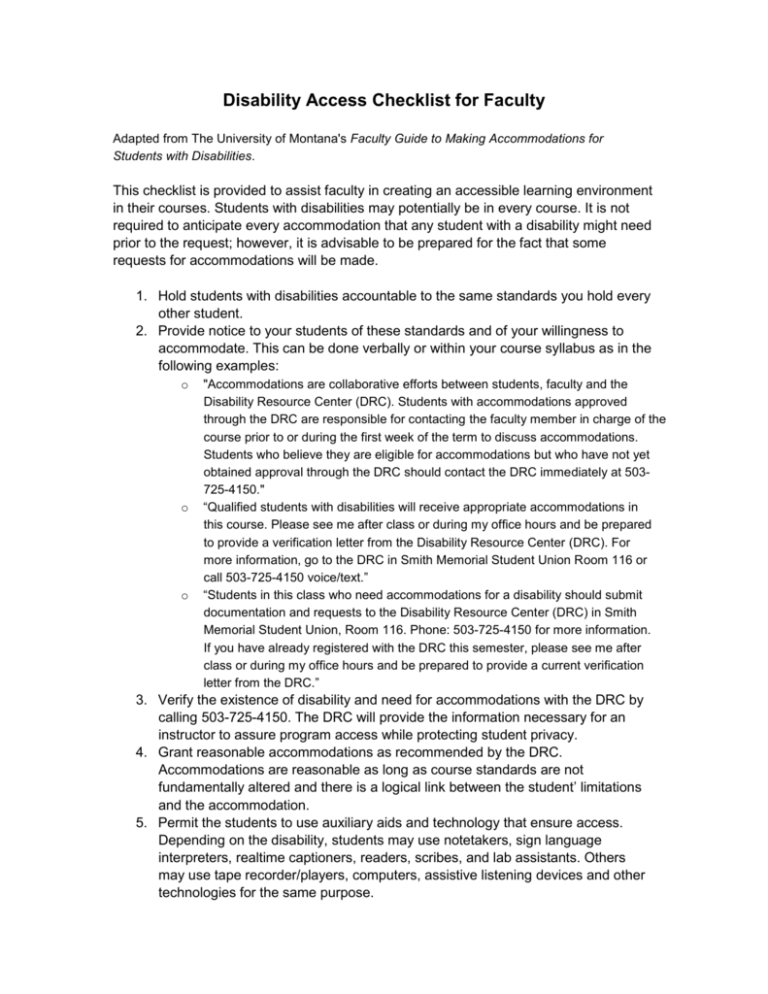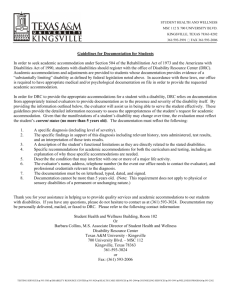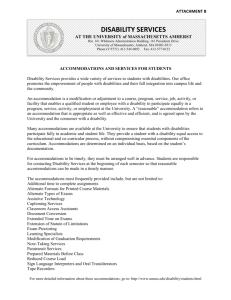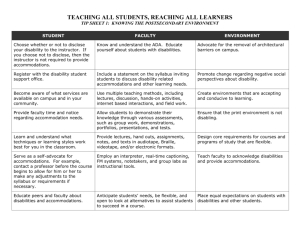Disability Access Checklist for Faculty
advertisement

Disability Access Checklist for Faculty Adapted from The University of Montana's Faculty Guide to Making Accommodations for Students with Disabilities. This checklist is provided to assist faculty in creating an accessible learning environment in their courses. Students with disabilities may potentially be in every course. It is not required to anticipate every accommodation that any student with a disability might need prior to the request; however, it is advisable to be prepared for the fact that some requests for accommodations will be made. 1. Hold students with disabilities accountable to the same standards you hold every other student. 2. Provide notice to your students of these standards and of your willingness to accommodate. This can be done verbally or within your course syllabus as in the following examples: o o o "Accommodations are collaborative efforts between students, faculty and the Disability Resource Center (DRC). Students with accommodations approved through the DRC are responsible for contacting the faculty member in charge of the course prior to or during the first week of the term to discuss accommodations. Students who believe they are eligible for accommodations but who have not yet obtained approval through the DRC should contact the DRC immediately at 503725-4150." “Qualified students with disabilities will receive appropriate accommodations in this course. Please see me after class or during my office hours and be prepared to provide a verification letter from the Disability Resource Center (DRC). For more information, go to the DRC in Smith Memorial Student Union Room 116 or call 503-725-4150 voice/text.” “Students in this class who need accommodations for a disability should submit documentation and requests to the Disability Resource Center (DRC) in Smith Memorial Student Union, Room 116. Phone: 503-725-4150 for more information. If you have already registered with the DRC this semester, please see me after class or during my office hours and be prepared to provide a current verification letter from the DRC.” 3. Verify the existence of disability and need for accommodations with the DRC by calling 503-725-4150. The DRC will provide the information necessary for an instructor to assure program access while protecting student privacy. 4. Grant reasonable accommodations as recommended by the DRC. Accommodations are reasonable as long as course standards are not fundamentally altered and there is a logical link between the student’ limitations and the accommodation. 5. Permit the students to use auxiliary aids and technology that ensure access. Depending on the disability, students may use notetakers, sign language interpreters, realtime captioners, readers, scribes, and lab assistants. Others may use tape recorder/players, computers, assistive listening devices and other technologies for the same purpose. 6. Grant testing accommodations as recommended by the DRC. Testing accommodations include but are not limited to extended time, alternative format, distraction-reduced environment, readers, and scribes. 7. Treat disability-related information with the strictest confidentiality. Refrain from identifying students with disabilities unnecessarily to their peers or other colleagues without student consent. Other tips which may enhance access to your courses: 1. Select course texts early. Blind and other students with print disabilities must begin early to obtain their texts in alternative formats. 2. When requested, provide alternatives to printed information such as class handouts or reserve materials in the library. Alternatives to print include Braille, computer electronic text, large print, and tape cassettes. If Internet resources or other technologies are used, then they must be accessible. The DRC coordinates provision of alternative formats. 3. Make academic adjustments in instruction. For students with hearing impairments, face the audience while speaking or use an FM receiver if requested. For students with visual impairments, read aloud or describe written or graphic information. 4. Consult with the student and/or the DRC for more helpful information on making your courses accessible. When Are Accommodations Not Provided? The College must provide accommodations unless they fall under one of the following three categories: 1. Fundamental Alteration: If an accommodation lowers the academic standards of the College, its programs, or courses, the College denies the accommodation and deems it unreasonable. Academic standards are essential for any student. It is unreasonable to alter these fundamental standards as an accommodation for a student with a disability. 2. Undue Hardship: If an accommodation costs too much or is impossible to administer, the College denies the accommodation and deems it unreasonable. An undue financial burden applies to the University system as a whole. Therefore, decisions regarding undue financial hardship can only be made by the Chancellor's office and cannot be made by a department, program or College. An undue administrative burden occurs when the College does not have enough time to respond to the request, or when it would be impossible or infeasible to administer. In every instance, the College reserves the right to offer other, equally effective accommodations. 3. Personal Service: If a request for an accommodation falls under the definition of a personal service, the College denies the request because it is unreasonable. Personal services are those that a person with a disability must use regardless of college attendance. In addition, personal services are those for which no correlation between the disability’s functional limitation and program access can be established. The college, for instance, does not purchase wheelchairs or other assistive technologies used in every setting to compensate for mobility impairment. Other examples of personal services include independent living, mental health, rehabilitation, and tutoring.







